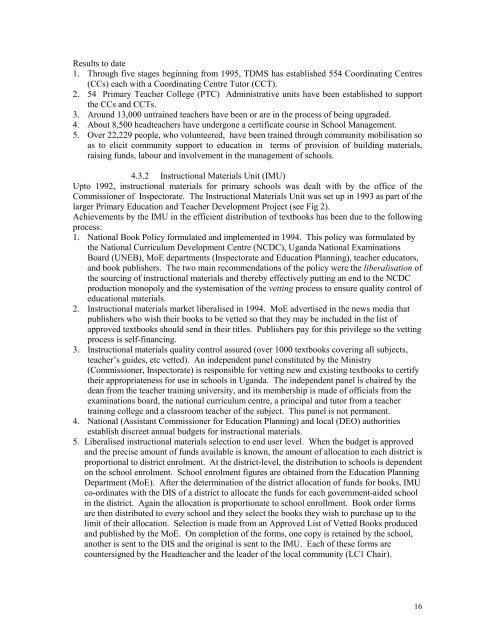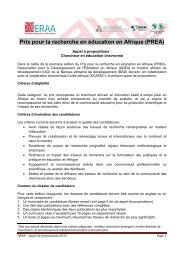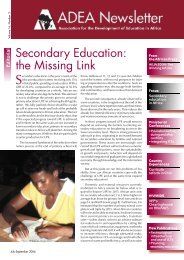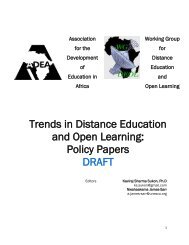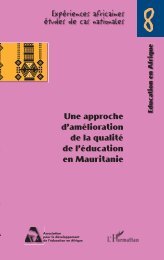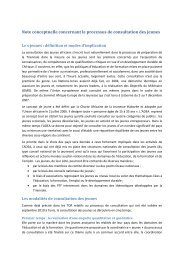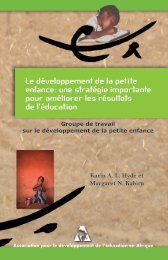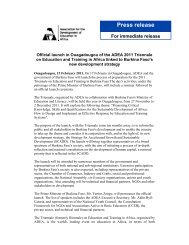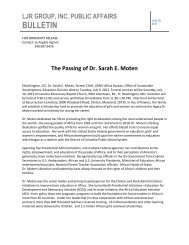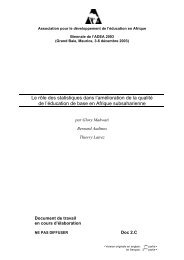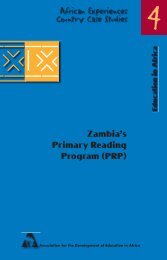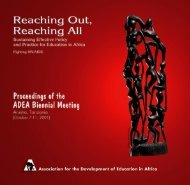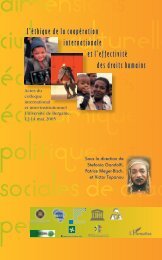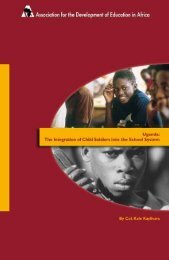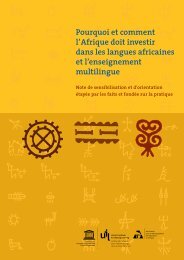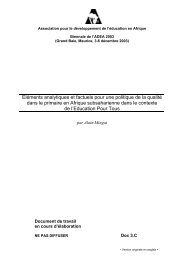the ugandan experience of universal primary education (upe) - ADEA
the ugandan experience of universal primary education (upe) - ADEA
the ugandan experience of universal primary education (upe) - ADEA
You also want an ePaper? Increase the reach of your titles
YUMPU automatically turns print PDFs into web optimized ePapers that Google loves.
Results to date<br />
1. Through five stages beginning from 1995, TDMS has established 554 Coordinating Centres<br />
(CCs) each with a Coordinating Centre Tutor (CCT).<br />
2. 54 Primary Teacher College (PTC) Administrative units have been established to support<br />
<strong>the</strong> CCs and CCTs.<br />
3. Around 13,000 untrained teachers have been or are in <strong>the</strong> process <strong>of</strong> being upgraded.<br />
4. About 8,500 headteachers have undergone a certificate course in School Management.<br />
5. Over 22,229 people, who volunteered, have been trained through community mobilisation so<br />
as to elicit community support to <strong>education</strong> in terms <strong>of</strong> provision <strong>of</strong> building materials,<br />
raising funds, labour and involvement in <strong>the</strong> management <strong>of</strong> schools.<br />
4.3.2 Instructional Materials Unit (IMU)<br />
Upto 1992, instructional materials for <strong>primary</strong> schools was dealt with by <strong>the</strong> <strong>of</strong>fice <strong>of</strong> <strong>the</strong><br />
Commissioner <strong>of</strong> Inspectorate. The Instructional Materials Unit was set up in 1993 as part <strong>of</strong> <strong>the</strong><br />
larger Primary Education and Teacher Development Project (see Fig 2).<br />
Achievements by <strong>the</strong> IMU in <strong>the</strong> efficient distribution <strong>of</strong> textbooks has been due to <strong>the</strong> following<br />
process:<br />
1. National Book Policy formulated and implemented in 1994. This policy was formulated by<br />
<strong>the</strong> National Curriculum Development Centre (NCDC), Uganda National Examinations<br />
Board (UNEB), MoE departments (Inspectorate and Education Planning), teacher educators,<br />
and book publishers. The two main recommendations <strong>of</strong> <strong>the</strong> policy were <strong>the</strong> liberalisation <strong>of</strong><br />
<strong>the</strong> sourcing <strong>of</strong> instructional materials and <strong>the</strong>reby effectively putting an end to <strong>the</strong> NCDC<br />
production monopoly and <strong>the</strong> systemisation <strong>of</strong> <strong>the</strong> vetting process to ensure quality control <strong>of</strong><br />
<strong>education</strong>al materials.<br />
2. Instructional materials market liberalised in 1994. MoE advertised in <strong>the</strong> news media that<br />
publishers who wish <strong>the</strong>ir books to be vetted so that <strong>the</strong>y may be included in <strong>the</strong> list <strong>of</strong><br />
approved textbooks should send in <strong>the</strong>ir titles. Publishers pay for this privilege so <strong>the</strong> vetting<br />
process is self-financing.<br />
3. Instructional materials quality control assured (over 1000 textbooks covering all subjects,<br />
teacher’s guides, etc vetted). An independent panel constituted by <strong>the</strong> Ministry<br />
(Commissioner, Inspectorate) is responsible for vetting new and existing textbooks to certify<br />
<strong>the</strong>ir appropriateness for use in schools in Uganda. The independent panel is chaired by <strong>the</strong><br />
dean from <strong>the</strong> teacher training university, and its membership is made <strong>of</strong> <strong>of</strong>ficials from <strong>the</strong><br />
examinations board, <strong>the</strong> national curriculum centre, a principal and tutor from a teacher<br />
training college and a classroom teacher <strong>of</strong> <strong>the</strong> subject. This panel is not permanent.<br />
4. National (Assistant Commissioner for Education Planning) and local (DEO) authorities<br />
establish discreet annual budgets for instructional materials.<br />
5. Liberalised instructional materials selection to end user level. When <strong>the</strong> budget is approved<br />
and <strong>the</strong> precise amount <strong>of</strong> funds available is known, <strong>the</strong> amount <strong>of</strong> allocation to each district is<br />
proportional to district enrolment. At <strong>the</strong> district-level, <strong>the</strong> distribution to schools is dependent<br />
on <strong>the</strong> school enrolment. School enrolment figures are obtained from <strong>the</strong> Education Planning<br />
Department (MoE). After <strong>the</strong> determination <strong>of</strong> <strong>the</strong> district allocation <strong>of</strong> funds for books, IMU<br />
co-ordinates with <strong>the</strong> DIS <strong>of</strong> a district to allocate <strong>the</strong> funds for each government-aided school<br />
in <strong>the</strong> district. Again <strong>the</strong> allocation is proportionate to school enrollment. Book order forms<br />
are <strong>the</strong>n distributed to every school and <strong>the</strong>y select <strong>the</strong> books <strong>the</strong>y wish to purchase up to <strong>the</strong><br />
limit <strong>of</strong> <strong>the</strong>ir allocation. Selection is made from an Approved List <strong>of</strong> Vetted Books produced<br />
and published by <strong>the</strong> MoE. On completion <strong>of</strong> <strong>the</strong> forms, one copy is retained by <strong>the</strong> school,<br />
ano<strong>the</strong>r is sent to <strong>the</strong> DIS and <strong>the</strong> original is sent to <strong>the</strong> IMU. Each <strong>of</strong> <strong>the</strong>se forms are<br />
countersigned by <strong>the</strong> Headteacher and <strong>the</strong> leader <strong>of</strong> <strong>the</strong> local community (LC1 Chair).<br />
16


